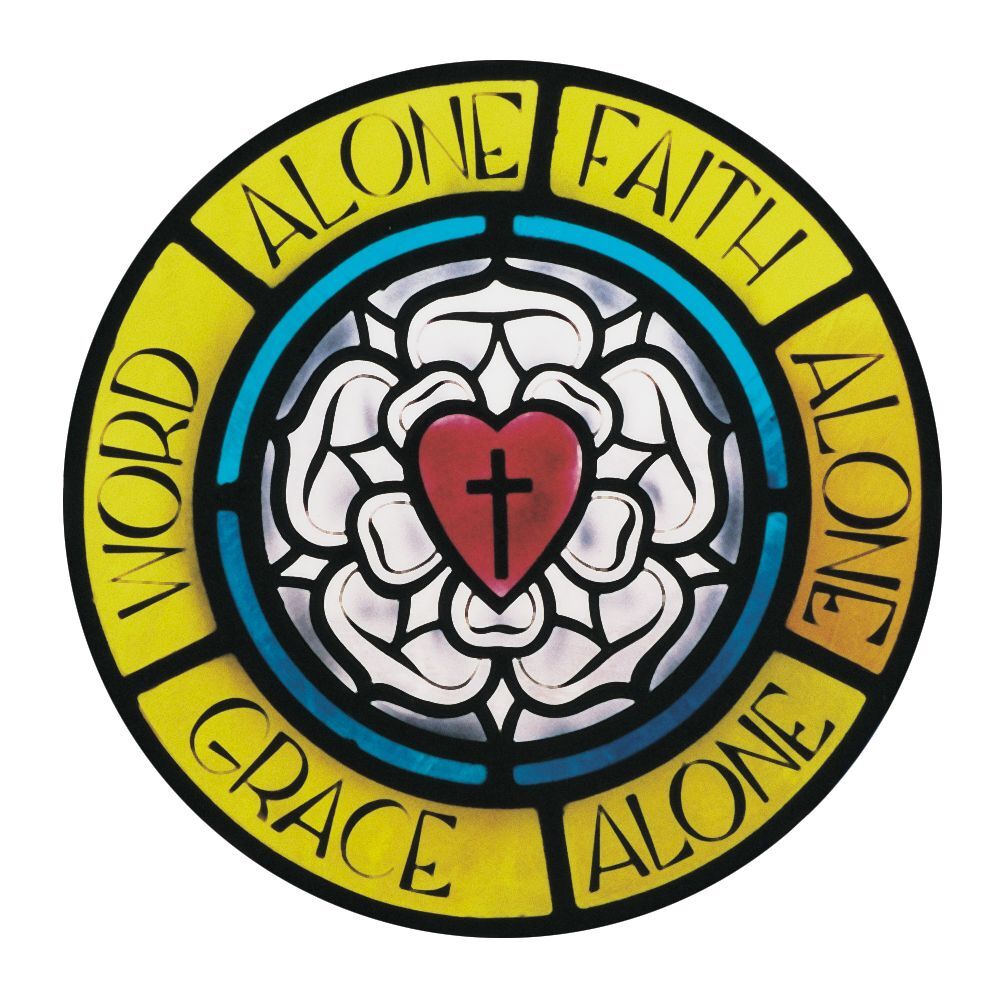We're glad you took a moment to visit us.
What are the people of St. Paul Lutheran all about?
St. Paul Lutheran Church is a member of the Lutheran Church—Missouri Synod (LCMS) which is a mission-oriented and Bible-based denomination that confesses the historic, orthodox Christian faith in the Triune God, Father, Son, and Holy Spirit, a faith built on “the foundation of the apostles and prophets, Christ Jesus himself being the cornerstone” (Eph. 2:20).
Our pastors, church property, ministries and members conduct themselves in a way that is consistent with these beliefs, which can be found in detail at lcms.org.

We Believe:
 People live in a broken relationship with God, unable to save themselves by their own works.
People live in a broken relationship with God, unable to save themselves by their own works.
- the entire Bible is the sole basis of all teaching and life with God. It is inspired by God and completely reliable. It doesn’t simply contain God’s Word, but actually is God’s Word and contains no errors or contradictions.
- in the Triune God; God has revealed Himself to us as three distinct persons (Matthew 28:19) in one divine being (Deuteronomy 6:4); these three persons are God the Father, God the Son, who became incarnate as Jesus of Nazareth, and God the Holy Spirit;
- that while the existence of God is revealed in nature (Psalm 19:1), it is only through His Word that we can learn who God is and His love for us. Because the words of the Old and New Testaments are the Word of God, inspired by His Holy Spirit (2 Timothy 3:16) through the pen of the apostles and prophets (2 Peter 1:21), we believe that these writings are without mistake and can be trusted as the only authoritative rule and source of Christian doctrine; that all of creation came into being through the Word of God (Genesis 1, John 1:2) and was created perfect; that this perfection was lost due to the first sin of Adam and Eve; and that all descendants of Adam and Eve inherit the corruption caused by this first sin (original sin) and are now conceived and born in sin (Psalm 51:5; Romans 5:12);
- that while we were still sinners and bearing the guilt of sin, the Son of God took on human flesh and lived among us (John 1:14), solely out of unmerited grace and love, in order to live in perfect obedience to God’s law and to be a perfect, innocent sacrifice on the cross in the place of sinners (Hebrews 10:10);
- that early on the third day after his crucifixion, Jesus Christ was bodily resurrected from the dead (Matthew 28:6; Mark 16:6; Luke 24:6; John 20:27) and that still today the incarnate Christ is seated at the right hand of God the Father (Acts 7:56);
- that pardon from sin and peace with God were won for the whole world through the suffering, death, and resurrection of Jesus Christ (1 John 2:2);
- that the forgiveness of sins and everlasting life won by Christ are received by faith, and are distributed even today by Christ Himself through the proclamation of His Word (Romans 10:17) and the administration of His Sacraments; the Word and Sacraments are called “means of grace” because they are the means by which Christ comes to His people with His grace;
- that Holy Baptism is one such means of grace; that it is a work of God, by which he calls people (including infants and little children) by water and His Word, gives them his Holy Spirit, creates faith within them, and washes away all sin (Acts 2:38; 1 Peter 3:21; Titus 3:5);
- that the Lord’s Supper is also a means of grace, where we receive the very body and blood of our Lord Jesus Christ, really present in with and under the bread and wine, given by Christ himself for Christians to eat and to drink for the forgiveness of sins (Matthew 26:26-28; Mark 14:22-24; Luke 22:19-20; 1 Corinthians 11:17-32);
- that the work of creating, sustaining, and strengthening faith is not a work of man but a work of God alone, carried out by the Holy Spirit (1 Corinthians 12:3);
- that Christ will visibly return on the last day to give bodily resurrection to all the dead, to judge both the living and the dead, to grant eternal life to all believers, and to deliver all unbelievers into eternal condemnation (Matthew 25:31-32).
As a congregation, St. Paul Lutheran Church is a member of the Lutheran Church Missouri Synod, a group of roughly 6,000 other Lutheran churches in the United states, as well as 30 Lutheran church groups in other countries throughout the world. Together we hold a common belief regarding what the Bible teaches. These teachings are drawn directly from the Bible and further clarified in the Book of Concord, a collection of confessions of our faith that date back to Martin Luther and the Reformation.
Missouri Synod
(The following is taken from the Lutheran Church Missouri Synod website.)
Overview
With the universal Christian Church, The Lutheran Church—Missouri Synod teaches and responds to the love of the Triune God: the Father, creator of all that exists; Jesus Christ, the Son, who became human to suffer and die for the sins of all human beings and to rise to life again in the ultimate victory over death and Satan; and the Holy Spirit, who creates faith through God’s Word and Sacraments. The three persons of the Trinity are coequal and coeternal, one God.
Being “Lutheran,” our congregations accept and teach Bible-based teachings of Martin Luther that inspired the reformation of the Christian Church in the 16th century. The teaching of Luther and the reformers can be summarized in three short phrases: Grace alone, Faith alone, Scripture alone.

Grace alone
God loves the people of the world, even though they are sinful, rebel against Him and do not deserve His love. He sent Jesus, His Son, to love the unlovable and save the ungodly.

Faith alone
By His suffering and death as the substitute for all people of all time, Jesus purchased and won forgiveness and eternal life for them. Those who hear this Good News and believe it have the eternal life that it offers. God creates faith in Christ and gives people forgiveness through Him.

Scripture alone
The Bible is God’s inerrant and infallible Word, in which He reveals His Law and His Gospel of salvation in Jesus Christ. It is the sole rule and norm for Christian doctrine.
Who is Jesus?
For more than 2,000 years people have asked the question, “Who is Jesus?”. We were not present when Jesus lived on this earth, but in the Bible we have the record of his birth, life, death on the cross, and resurrection. When you "dig in" to God’s Word, it will enable you to clearly find out the answer to this age-old question.
What does “Synod” mean?
The word “Synod” in The Lutheran Church–Missouri Synod comes from Greek words that mean “walking together.” The term has rich meaning in our church body, because congregations voluntarily choose to belong to the Synod. Though diverse in their service, these congregations hold to a shared confession of Jesus Christ as taught in Holy Scripture and the Lutheran Confessions which they believe are a correct interpretation and presentation of Biblical doctrine. Contained in The Book of Concord: The Confessions of the Evangelical Lutheran Church, these statements of belief were put into writing by church leaders during the 16th century. The simplest of these is Luther's Small Catechism. The Augsburg Confession gives more detail on what Lutherans believe.
Study Resources
The Synod's Commission on Theology and Church Relations provides study documents and statements of theological issues. Answers to theological questions may be found on the Frequently Asked Questions web site.
The Christian Cyclopedia has served thousands of students, church professionals, and lay persons as a one-volume compendium of historical and theological data, ranging from ancient figures to contemporary events.
In addition, a series of helpful downloadable pamphlets offer insight on variety of doctrinal topics, moral issues and concerns in the church. We also invite you to learn more about specific worship practices of the Synod.
Lutheran Confessions
(The following is taken from the Lutheran Church of the Missouri Synod website.)
The Lutheran Church—Missouri Synod accepts the Scriptures as the inspired and inerrant Word of God, and subscribes unconditionally to all the symbolical books of the Evangelical Lutheran Church as a true and unadulterated statement and exposition of the Word of God. We accept the Confessions because they are drawn from the Word of God and on that account regard their doctrinal content as a true and binding exposition of Holy Scripture and as authoritative for all pastors, congregations and other rostered church workers of The Lutheran Church—Missouri Synod.
These texts are in the public domain and may be copied and distributed freely. The source of these translations is Triglot Concordia: The Symbolical Books of the Evangelical Lutheran Church (St. Louis: Concordia Publishing House, 1921).
